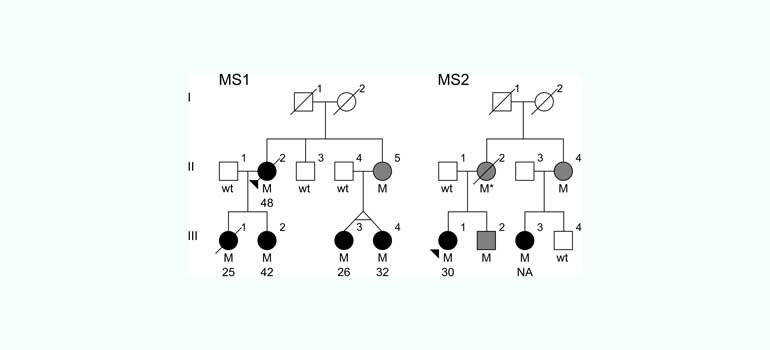 Scientists at the University of British Columbia and Vancouver Coastal Health have proven that multiple sclerosis (MS) can be caused by a single genetic mutation — a rare alteration in DNA that makes it very likely a person will develop the more devastating form of the neurological disease.
Scientists at the University of British Columbia and Vancouver Coastal Health have proven that multiple sclerosis (MS) can be caused by a single genetic mutation — a rare alteration in DNA that makes it very likely a person will develop the more devastating form of the neurological disease.
The mutation was found in two Canadian families that had several members diagnosed with a rapidly progressive type of MS, in which a person’s symptoms steadily worsen and for which there is no effective treatment.
The discovery of this mutation should erase doubts that at least some forms of MS are inherited. The prevailing view has been that a combination of many genetic variations cause a slight increase in susceptibility. In the two families described in this study,
«This mutation puts these people at the edge of a cliff, but something still has to give them the push to set the disease process in motion," said senior author Carles
Although only one in 1,000 MS patients appears to have this mutation, its discovery helps reveal the biological pathway that leads to the rapidly progressive form of the disease, accounting for about 15 per cent of people with MS. The discovery could also provide insight into the more common, fluctuating form of MS, known as «
The findings, published today in the journal Neuron, could help in the search for therapies that act upon the gene itself or counteract the mutation’s
«If you have this gene, chances are you will develop MS and rapidly deteriorate," said
Background on MS and this discovery:
Signal disruption: Multiple sclerosis results from the body’s immune system attacking myelin, the fatty material that insulates neurons and enables rapid transmission of electrical signals. When myelin is damaged, communication between the brain and other parts of the body is disrupted, leading to vision problems, muscle weakness, difficulty with balance and coordination, and cognitive impairments. Canada has one of the highest rate of MS in the world, for reasons that elude scientists. An estimated 100,000 Canadians are living with MS, and the disease is most often diagnosed in young adults, aged 15 to 40.
Defective protein: The
Early intervention: People with a family history of MS could be screened for this mutation, and if they carry it, could be candidates for early diagnostic imaging long before symptoms appear; or they could opt to increase their intake of Vitamin D (low levels of which have been associated with the disease). If someone diagnosed with
A more realistic animal model:
Thousands of samples: The families with this mutation had donated to a
Source: http://news.ubc.ca/2016/06/01/ubc-vancouver-coastal-health-scientists-find-genetic-cause-of-multiple...


